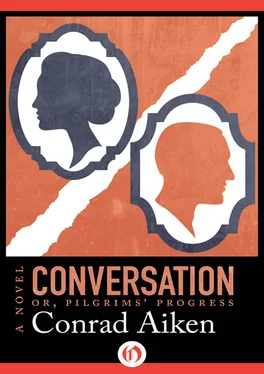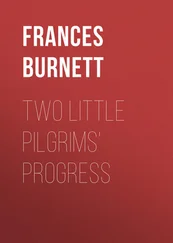Yes; for this all-releasing dream, this dream of the pure embrace, airborne and wind-blown, this whirling and halcyon love, in which the beloved face had become one with his own, the white shoulders and breasts and clinging thighs and knees as if his own body, the throbbing embrace hung ecstatically in sunset light — this ever-clearer dream, as it glowed creatively down from plane to plane of memory, through trapdoor after trapdoor, like a lantern casting down its light through successive floors of a dark house, touched now his childhood too, brought that back as near and clear as Enid, and with precisely the same fresh and vernal significance. Like those tiny Japanese folded flowers, made of desiccated wood and tissue, no bigger than seeds, which open out, when put in water, to become irises or almond blossoms, or dark leaves, these images now opened to join the others. The intense and radiant reality, above all, of a girl’s face, a hand, a hard green acorn on a branch, the sunlit iris of an eye, the hairs on a grasshopper’s leg, the swimming colors of a wet stone, the intricacy of ordinary grass, or the inexhaustible mystery of the simple dust that lay in a country road, this dust that was warm and friendly under one’s naked foot, and between one’s toes, this extraordinary stuff that was the earth’s substance, the very earth —suddenly he knew these things again as vividly as he had known them in his childhood in New Bedford, and as vividly as Buzzer — who followed him intently, silently, oak-branch in hand — knew them now. It was like coming alive again. He was alive again, and the whole blazing world alive with him, everything belonging to everything else, and everything with one and the same meaning.
He stopped, stood still, stared down at the beached dory which lay on the sand before him, its galvanized iron anchor, sea-gray, half-buried in the sand, then, drawing his feet together, jumped neatly over it, brandishing his tomahawk in the air.
“Tirra-lirra, tirra-lee! — ” he said.
“Daddy, you were supposed to be quiet ! They’ll know we’re coming!”
“ Let them know. That was my war cry, see? And now they know that every Indian, every man-jack of them, must bite the dust!”
“ That wasn’t a war cry. You said that yesterday.”
“Did I? Well, perhaps I did. But it doesn’t matter. It’s as good as fee fie fo fum.”
“Ho ho! That was what the giant said, silly!”
“So it was. But it was a kind of a war cry, just the same, to let the Englishmen know he was coming. Shall we go for a sail in this dory? An imaginary one, you know, with imaginary oars and an imaginary sail, on an imaginary river. Hmm, I see it’s got a name, too, it’s called Catfish . Now why do you suppose it’s called Catfish? Doesn’t look like a cat, doesn’t look like a fish, doesn’t look like a catfish—”
“What does a catfish look like, daddy?”
“Well, you see, a catfish has whiskers, like a cat—”
“Ho ho, does it really? But it couldn’t miaow like a cat, because fishes haven’t got any voices.”
“Foo! Don’t you remember the fish that talked in the frying pan?”
“That was only in a story. It couldn’t really talk. Shall we go for a sail?”
“Well, I’m afraid not, my pet. It’s late, and I think maybe we’d better get a move on. Let’s see how quickly we can get there — you run, and I’ll walk with my seven-league boots, and we’ll be across the road and past the blacksmith shop in a jiffy, and then over Mr. Riley’s nets in a single leap — come on now, a little speed! And it’s going to rain, it’s going to pour pitchforks—”
He clapped his hands and she was gone at a gallop, scrambling up the sand path by the beach plums to the bridge road — the bridge loomed gray and ghostly in the thinning fog, a car came rattling over the loose boards, kicking and rumbling, and when he emerged on to the road, under the dripping poplars, the small blue figure was already halfway across Mr. Riley’s field. In another moment she had gone down out of sight into the lane that led to the Town Landing, reappeared bustling up the steps to the lilac hedge by the pump house, and then finally vanished around the corner of the kitchen. Extraordinary child — where the devil had she come from? Extraordinary to think that this was Enid and himself, Enid and himself conjoined! — That summer, before she was born, when day after day, waiting, they had played three-handed bridge, Enid and himself and Enid’s mother, fanning themselves in the stifling heat of the County Street house, drinking iced lemonade out of tinkling glasses, listening to the four-noted clink of the well chain in the garden through the opened windows — that summer, she had not existed. The ripening pears hung heavy among hot leaves in the garden, the box hedges smelled dustily of the sun, the cherries had long since been gathered and eaten, the green clusters of the grapes, under the broad laves, were beginning to redden, to purple. And New Bedford, with its old wharves and stone warehouses, the Point Road leading to the Fort, and the wide hot Bay, which one could see from the little hexagonal cupola at the top of the house, all the way to the blue islands, was complete and alive, as it had always been. But there was no Buzzer. And then the terrifying reality of the childbirth — Enid walking to and fro, her hand pressed to her back, the beautiful mouth curved and tense with pain and apprehension; Enid holding on to the banisters, desperate, her whole body arched and taut like a bow — and at last, late at night, the animal throe in lamplight, the quick and sickening divulgence of the bloodstained little animal, with its cry of misery, which was Buzzer, which was to become Buzzer! Astonishing, that out of such horror, and a chrysalis so ignoble and so violent, such beauty and brightness could have emerged — how the devil was one to explain it? And nevertheless, now, in the light of the all-exploring delicious dream of Enid and Nora, perhaps one could at last accept the bloody roots — the roots were no longer to be reprehended, they had their own dreadful and lightninglike beauty, they were oneself, one’s hand, one’s heart, one’s god.…
Yes, but there was Ee still, this ominous attitude of Ee’s—
The thought checked him, as he went up the wet wooden steps to the garden, the house was silent except for the irregular fog-drip from the trees on the kitchen roof— spat-spat-spat —and as he passed the kitchen window he looked quickly in, over the sink, but Ee was nowhere to be seen. The ironing must be finished, perhaps she had gone out. The pump-house door was open, and out of the pump house, bareheaded, the inevitable yellow foot rule in his hand, stepped Ratio Binney. The shrewd Yankee face, the quick gray eyes, the narrow smile, the corduroy trousers.
“Oh, good morning, Mr. Kane! I was just taking a look. I couldn’t raise anybody from the house—”
“Morning, Ratio. You couldn’t? Guess Mrs. Kane must have gone out—”
“Yes, I rang and rang, and knocked on your kitchen door. Mrs. Kane said something on the telephone about the cesspool—?”
He pointed, with the yellow rule, towards the foot of the garden, the new lilac hedge.
“Yes, I know.”
“What seems to be the trouble.”
“Well, I guess we just use too much water. And the cesspool seems to be overflowing. The water stands there, down in the corner — seems to be a sort of little cave-in starting. Come and see it.”
The broad circle of sand, in the angle made by the new lilacs, still showed where the cesspool had been dug, the deep well of bricks sunk in the ground — in spite of repeated reseedings the grass above it was still sparse. Damn, and this would mean a further delay! At the edge nearest the terrace wall Ratio kicked with the toe of a scarred shoe at a small subsidence, where the sand was wet and smooth, as if just washed up from below.
Читать дальше












